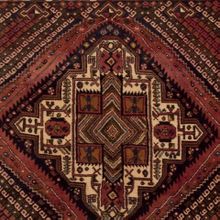Shahr-e-babak Rug
From the city of that name in southern Persia, the incredible Kerman carpet is a soft treasure, and among the most beautiful designs woven. The traditional motif has the main border and central medallion in an intricately-detailed, ornate architectural or floral theme in the palest pastels with white-and-gold trim. This typically contrasts with an open field of a rich solid cranberry red, navy blue or other strong colors. Others patterns include the finer Lavar style with garden, tree-of-life, vase and all-over mille fleur designs, or the many pictorials which tell the story of a significant figure or event in history. Silk is almost never used.
| Shahr-e-babak Rug | |
|---|---|
 Design of Shahr-e-babak Rug (Rugman) | |
| General information | |
| Name | Shahr-e-babak Rug |
| Original name | قالی شهربابک |
| Alternative name(s) | Shahr-e-babak Carpet |
| Origin | |
| Category | Village |
| Technical information | |
| Common designs | Medallion, Geometric, Vase |
| Common colors | Red, Brown, White, Golden, Blue |
| Dyeing method | Natural, Synthetic |
| Pile material | Wool |
| Foundation material | Cotton |
| Knot type | Asymmetrical (Persian) |
History
Materials
Foundation and Pile
Techniques and structures
Color and dyeing
Motifs and Designs
Weaving techniques
See also
References
Bibliography
Abraham Levi Moheban, (2015), The Encyclopedia of Antique Carpets: Twenty-Five Centuries of Weaving, NewYork: Princeton Architectural Press.